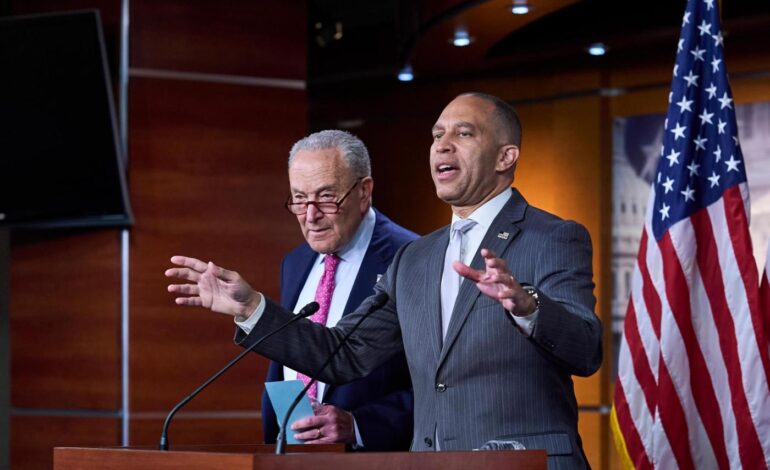Democrats Challenge GOP to Avoid Government Shutdown by Month-End

The risk of a government shutdown at the end of March 2024 has escalated as Democrats have announced their intention to oppose a stopgap spending measure. This decision follows the Republican leadership’s refusal to accommodate Democratic demands, particularly regarding funding for extending health insurance subsidies.
Republican leaders have introduced a continuing resolution, expecting to hold a vote in the House on March 1. This bill aims to maintain current funding levels until November 21, with hopes that this period will facilitate bipartisan negotiations for a comprehensive spending agreement. It also includes increased funding for security measures for the executive branch, Supreme Court, and Congress, particularly in light of recent events surrounding the assassination of activist Charlie Kirk.
Democrats Stand Firm on Healthcare Subsidies
Democrats are insisting that any agreement to keep the government open must include provisions to renew health insurance subsidies that were not included in recent Republican tax and spending legislation. While some Republicans have expressed interest in discussing the renewal of these subsidies to prevent rising premiums, they have not agreed to include them in the current funding debate.
Democratic leaders, including Senate Majority Leader Chuck Schumer and House Minority Leader Hakeem Jeffries, have criticized Republican leaders for refusing to negotiate on this issue, suggesting that such intransigence is pushing the country closer to a shutdown. They stated, “At a time when families are already being squeezed by higher costs, Republicans refuse to stop Americans from facing double-digit hikes in their health insurance premiums.”
The funding bill can pass the House without Democratic votes, but it requires the support of at least seven Democrats in the Senate to overcome the 60-vote filibuster. Currently, only Senator John Fetterman of Pennsylvania has indicated he might support the continuing resolution, having previously expressed his opposition to government shutdowns as detrimental to political stability.
Political Blame Game Intensifies
As the deadline approaches, Republicans have shifted blame to the Democrats, accusing them of inserting partisan politics into discussions about government funding. House Majority Leader Steve Scalise stated, “If Democrats want to shut the government down and continue to hold America hostage because they don’t like the results of the election, the American people are fed up with that kind of childish politics.”
Similar tensions were evident during the government funding negotiations in March 2024, when Schumer faced backlash for supporting a stopgap bill that critics argued would empower the Trump administration unnecessarily. The current landscape shows that Democrats, lacking significant leverage, are wary of being perceived as yielding to Republican demands without gaining concessions.
Political analysts emphasize the importance of public perception in this standoff. Chris Devine, an associate professor of political science at the University of Dayton in Ohio, remarked, “It comes down to public opinion and who is able to convince the public that they’re not the ones being stubborn and obstinate, but actually are fighting for the right thing.” He suggested that while Democrats could benefit from framing their opposition as principled, failing to communicate effectively could backfire.
Republicans argue that a “clean” continuing resolution, free of partisan policy riders, aligns with the past demands of Democrats. House Speaker Mike Johnson reiterated that there is “zero chance” of healthcare spending being attached to the stopgap bill, insisting that it will be a straightforward, short-term resolution.
With time running short, both parties face the challenge of navigating a complex political landscape, balancing the immediate needs of government funding against the long-term implications of their positions. The outcome of this impasse will likely shape the political dynamics leading into the next election cycle.






